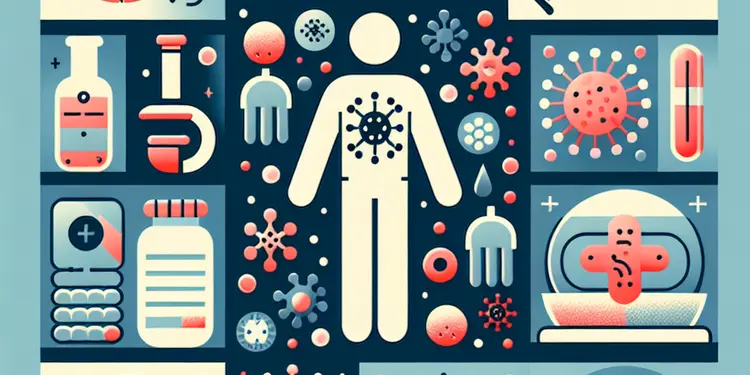Find Help
More Items From Ergsy search
-

Group A strep: North East GP tells you what you need to know
Relevance: 100%
-

Are there support groups for postnatal depression?
Relevance: 39%
-

Can I learn first aid as a group?
Relevance: 38%
-

Are there any support groups for people with dementia in the UK?
Relevance: 38%
-

What are peer support groups for community helpers?
Relevance: 36%
-

Are there support groups for those affected by testicular cancer?
Relevance: 36%
-

What is the Broader Group in the Warm Home Discount?
Relevance: 36%
-

Is asthma more common in certain age groups?
Relevance: 34%
-

Are there any groups exempt from the proposed cuts?
Relevance: 33%
-

Is it safe to participate in group sports while pregnant?
Relevance: 33%
-

Is appendicitis common in any particular age group?
Relevance: 33%
-

How can older adults find local hobby groups?
Relevance: 33%
-

What age group is most at risk for HPV?
Relevance: 33%
-

How can older adults find travel or adventure groups?
Relevance: 33%
-

How can I find NHS-recommended menopause support groups online?
Relevance: 33%
-

How can support groups benefit carers of Alzheimer's patients?
Relevance: 33%
-

How can older people find hobby groups that align with their interests?
Relevance: 32%
-

What age groups can benefit from self-testing?
Relevance: 32%
-

How can older people find new hobbies and groups?
Relevance: 32%
-

What age group is most at risk for grooming?
Relevance: 32%
-

Is HIV only a concern for certain groups of people?
Relevance: 31%
-

What actions are consumer rights groups taking regarding banking fee transparency?
Relevance: 30%
-
Is aspirin more effective for certain age groups in preventing colorectal cancer?
Relevance: 29%
-

What are some common fears or hesitations older adults have about joining new groups?
Relevance: 29%
-

Are there support groups for individuals with motor neurone disease?
Relevance: 28%
-

What age groups are most at risk for concussions in rugby?
Relevance: 28%
-

Are there any specific groups that should prioritize meningitis vaccination?
Relevance: 27%
-

Controversy Surrounds New Surveillance Legislation as Privacy Groups Voice Concerns
Relevance: 27%
-

Digital Banking: A Surge in Adoption Amongst All Age Groups
Relevance: 24%
-

What age group will first see the state pension age at 67?
Relevance: 24%
-
Are there any support groups for people with dementia in the UK?
Relevance: 24%
-
Are there any support groups for people with dementia in the UK?
Relevance: 24%
-

How can older individuals safely participate in new groups during health concerns?
Relevance: 22%
-

What is the Core Group in the Warm Home Discount?
Relevance: 22%
-

How long does it take for symptoms to appear?
Relevance: 22%
-

How soon do symptoms appear after infection?
Relevance: 21%
-

Causes of a sore throat
Relevance: 20%
-

Treating a sore throat
Relevance: 18%
-

Is taking antibiotics always bad?
Relevance: 17%
-

What causes flesh-eating disease?
Relevance: 16%
Group A Strep: North East GP Tells You What You Need to Know
What is Group A Strep?
Group A Streptococcus (GAS), commonly known as Group A strep, is a type of bacteria that can cause a range of infections. These infections can vary from mild illnesses, such as strep throat and impetigo, to more severe diseases like cellulitis and necrotizing fasciitis. Although many people carry GAS bacteria without showing symptoms, it's important to be aware of the potential health risks.Symptoms to Watch For
Common symptoms of Group A strep infections include a sore throat, difficulty swallowing, fever, and swollen lymph nodes. Skin infections may present as red, swollen, and painful areas on the skin, often with pus or other drainage. Severe infections can lead to more serious symptoms like rapid heartbeat, confusion, and rapid breathing. If you experience any worrying signs or symptoms, seek medical advice promptly.Transmission and Prevention
Group A strep is typically spread through direct contact with an infected person's saliva or nasal secretions, or by touching surfaces contaminated with these fluids. It can also be transmitted through wounds or breaks in the skin. To prevent the spread, practice good hygiene by washing hands frequently, covering your mouth and nose when coughing or sneezing, and avoiding close contact with infected individuals.Treatment and Management
Most Group A strep infections are effectively treated with antibiotics, typically penicillin or amoxicillin. Early diagnosis and prompt treatment are important to prevent complications. Patients should complete the full course of antibiotics even if symptoms improve. In cases of severe infection, hospitalisation and more intensive treatments may be necessary.When to Seek Medical Advice
If you or your child develop symptoms indicative of a Group A strep infection, particularly if they are severe or worsening, seek medical advice from your GP. Timely diagnosis and appropriate treatment are crucial for managing the infection and preventing complications. Always consult a healthcare professional if in doubt.Group A Strep: North East GP Tells You What You Need to Know
What is Group A Strep?
Group A Strep is a germ that can make you sick. It can cause illnesses like a sore throat and skin sores. Sometimes it can make you very sick. Some people have the germ but do not feel sick. It's good to know about it.
Symptoms to Watch For
If you have Group A strep, you might get a sore throat, trouble swallowing, a fever, or swollen glands in your neck. Your skin might get red, swollen, and hurt. You might see pus too. If you get very sick, your heart might beat fast, or you might feel confused or breathe quickly. If you feel sick like this, see a doctor.
Transmission and Prevention
You can catch Group A strep from someone's spit or snot, or by touching things that have the germ on them. It can get into your body through cuts or sores. To stop the spread, wash your hands, cover your mouth and nose when you cough or sneeze, and stay away from people who are sick.
Treatment and Management
Doctors treat Group A strep with medicines called antibiotics. You have to take all the medicine even if you feel better. This helps you get well and stop further sickness. If you get very sick, you might need to go to the hospital for more care.
When to Seek Medical Advice
If you or your child feels sick with symptoms of Group A strep, especially if they get worse, see the doctor. Getting help early is important to get better and stop any problems. Always ask a doctor if you're not sure what to do.
Frequently Asked Questions
What is Group A Streptococcus?
Group A Streptococcus (GAS) is a type of bacteria commonly found in the throat and on the skin. It can cause a range of illnesses, from mild sore throats to severe diseases.
How is Group A Strep spread?
GAS is spread through respiratory droplets from coughing or sneezing, direct contact with an infected person's skin, or sharing towels or bed sheets.
What are the common symptoms of a Group A Strep infection?
Common symptoms include sore throat, fever, red and swollen tonsils, and small red spots on the roof of the mouth. More severe cases can lead to skin infections or scarlet fever.
How is Group A Strep diagnosed?
A healthcare provider may take a throat swab to test for the presence of GAS bacteria. Results can typically be available within a few days.
What is the treatment for Group A Strep?
Group A Strep infections are usually treated with antibiotics, such as penicillin or amoxicillin, to reduce symptoms and prevent complications.
Can Group A Strep cause serious illness?
Yes, while many cases are mild, GAS can lead to severe infections like necrotising fasciitis or streptococcal toxic shock syndrome, which require urgent medical attention.
Is there a vaccine for Group A Strep?
Currently, there is no vaccine available for Group A Streptococcus, but research is ongoing to develop one.
How can I reduce the risk of getting Group A Strep?
Good hygiene practices such as regular hand washing, covering your mouth when coughing or sneezing, and avoiding close contact with infected individuals can help reduce the risk.
Are children more susceptible to Group A Strep infections?
Yes, children between the ages of 5 and 15 are more likely to contract strep throat, one of the most common infections caused by GAS.
What should I do if I suspect a Group A Strep infection?
If you suspect a Group A Strep infection, it is important to seek medical advice promptly. Early diagnosis and treatment can prevent complications.
Can I return to work or school after a Group A Strep infection?
You should stay at home until at least 24 hours after starting antibiotics to reduce the risk of spreading the infection to others.
Are there long-term complications from a Group A Strep infection?
In some cases, untreated GAS infections can lead to complications such as rheumatic fever or kidney inflammation, which require further medical care.
Can adults get Group A Strep infections?
Yes, while more common in children, adults can also contract Group A Strep infections. The symptoms and treatment remain similar across age groups.
Is it necessary to complete the entire course of antibiotics for Group A Strep?
Yes, completing the full course of antibiotics as prescribed is crucial to ensure the infection is fully eradicated and to prevent antibiotic resistance.
Can Group A Strep infections recur?
Yes, it is possible to get a Group A Strep infection more than once. Good hygiene and prompt treatment can help manage and prevent recurrence.
What is Group A Streptococcus?
Group A Streptococcus is a type of germ. Germs are tiny things that can sometimes make you sick. This germ can give you a sore throat or a skin infection.
If you want to learn more, you can ask someone you trust to help you read about it.
Group A Streptococcus (GAS) is a type of germ. This germ is often in your throat and on your skin. GAS can make you sick in different ways. Sometimes, it just gives you a sore throat. Other times, it can make you very sick.
If you need help with reading, you can use tools like audiobooks or apps that read text out loud. Talking with someone about what you read can also help.
How does Group A Strep spread?
Group A Strep is a germ. It can move from one person to another. Here is how it spreads:
- When someone with the germ coughs or sneezes, tiny drops come out.
- If these drops land on you, you can catch it.
- You can also get it if you touch something with the germ and then touch your face.
To stay safe, wash your hands often with soap and water. If you can't wash your hands, use hand gel. Try to stay away from people who are coughing or sneezing.
Using pictures or videos can help you understand better.
Germs can spread when someone with them coughs or sneezes. They can also spread by touching the skin of a sick person or by sharing towels or bed sheets with them.
What are the common signs of a Group A Strep infection?
Group A Strep is a kind of germ that can make you sick.
Here are some signs that you might have a Group A Strep infection:
- You might feel a sore throat. Your throat can hurt a lot.
- You might have a rash on your skin. It can be itchy or red.
- You might get a fever. This means your body feels very hot.
- You might have pain in your muscles. This can make your body feel achy.
- You might feel very tired. You may want to sleep a lot.
If you think you might have a Group A Strep infection, it is important to tell a grown-up or a doctor.
Tools that can help:
- Talk to someone you trust about how you feel.
- Use a thermometer to check if you have a fever.
- Drink plenty of water and rest.
Common signs are a sore throat, feeling hot (fever), red and puffy tonsils, and little red dots on the top of your mouth. If it's worse, it can cause skin problems or a sickness called scarlet fever.
How do doctors know if someone has Group A Strep?
Doctors look for signs that could mean you have Group A Strep. They might do a special test. This is called a "throat swab." It is quick and does not hurt. The doctor gently rubs a soft stick at the back of your throat. This helps them find out if you have Group A Strep.
Here are ways to help:
- Ask your doctor to explain things clearly.
- Ask questions if you do not understand.
- Take someone with you to help listen and remember what the doctor says.
The doctor or nurse may use a small stick with a soft tip (a swab) to take a sample from your throat. This is to check for germs called GAS bacteria. You can usually find out the results in a few days.
How do doctors help if you have Group A Strep?
Doctors use medicine called antibiotics to help people get better from Group A Strep infections. Two common antibiotics are called penicillin and amoxicillin. These medicines help to feel better and stop other problems from happening.
If reading is hard, you can ask someone to read it to you or use a computer or phone to read it out loud. It’s okay to take your time and ask questions if you want to know more.
Can Group A Strep make you very sick?
Group A Strep is a type of germ. Sometimes, it can make people very sick.
If you feel very sick, see a doctor. They can give you medicine to help.
Tools that can help:
- Doctors and nurses can help you understand.
- Ask a family member or friend to help read with you.
Yes, sometimes the infection is not too bad. But sometimes it can be very serious. The infection can cause things like a severe skin infection or a serious illness. If this happens, you need to see a doctor quickly.
Is there a vaccine for Group A Strep?
There is no vaccine for Group A Strep right now. But doctors and scientists are working hard to make one. Group A Strep is a type of germ that can make people sick.
If you have questions or need help, ask someone you trust like a doctor, a nurse, or a teacher. They can give you more information and support.
To understand better, you can use tools like picture charts or ask an adult to explain it with simple words.
Right now, there is no shot to stop Group A Strep, but scientists are working hard to make one.
How can I stay safe from Group A Strep?
Here are some ways to keep safe from getting sick with Group A Strep:
- Wash your hands often with soap and water.
- Use hand sanitizer if you can’t wash your hands.
- Keep your hands away from your face, especially your eyes, nose, and mouth.
- Stay away from people who are sick.
- Cover your mouth and nose with a tissue or your elbow when you cough or sneeze.
- Help everyone in your family wash their hands too.
- Make sure you keep shared spaces and things clean.
These tips can help you stay healthy.
Washing your hands often, covering your mouth when you cough or sneeze, and staying away from people who are sick can help you not get sick.
Do children get sick from Group A Strep more easily?
Yes, kids who are 5 to 15 years old can catch strep throat more easily. Strep throat is a common infection from germs called GAS.
What to Do if You Think You Have a Group A Strep Infection
Group A Strep is a type of germ (bacteria) that can make you sick.
If you think you have it, here is what you can do:
- Tell a grown-up (like a parent or teacher) how you feel.
- Visit a doctor or nurse to get help. They can check if you have Group A Strep.
- Keep away from other people to stop spreading germs.
Ask someone to come with you to the doctor if you need support.
Use pictures or drawings to help explain what hurts or how you feel.
If you think you might have a Group A Strep infection, talk to a doctor right away. Getting help early can stop it from getting worse.
Can I go back to work or school after having a Strep infection?
If you had a Strep infection, you can usually go back to work or school after taking medicine from the doctor for 24 hours. The medicine helps you get better and stops you from spreading germs to other people.
To help you remember to take your medicine, you can set a timer or ask someone to remind you.
Always wash your hands with soap and water to keep from spreading germs.
Stay home until you have been taking medicine for 1 whole day. This helps stop germs from spreading to other people.
Can Group A Strep make you feel sick for a long time?
Sometimes, if you don't treat a strep throat infection, it can cause more problems. These problems can include something called rheumatic fever or swelling in the kidneys. These problems need a doctor to help make you better.
Can grown-ups get Group A Strep germs?
Yes, grown-ups can get germs called Group A Strep. These germs can make your throat sore or your skin red and itchy.
If you feel sick, tell a doctor. They can help you feel better.
Helpful tools: Pictures of germs, a simple chart with how you might feel, or listening to someone read to you.
Yes, adults can also get sick from something called Group A Strep. This usually makes kids sick, but grown-ups can get it too. The signs of being sick and the way doctors help are mostly the same for everyone.
Do I need to take all the antibiotics for Group A Strep?
If you have Group A Strep, the doctor gives you medicine called antibiotics. It is important to take the medicine every day like the doctor says. You should finish all the medicine, even if you start feeling better. This can help make sure the germs are all gone. Here are some tips to help you remember to take your medicine: - Make a chart and tick off each dose you take. - Set an alarm to remind you when it's time to take your medicine. - Ask an adult to help you remember.
It is very important to take all the medicine the doctor gives you. This helps to make sure the germs are gone and stops them from getting stronger against the medicine.
Can Group A Strep infections come back?
Yes, you can get a Group A Strep infection more than one time. Keeping clean and getting treatment quickly can help stop it from happening again.
Useful Links
This website offers general information and is not a substitute for professional advice.
Always seek guidance from qualified professionals.
If you have any medical concerns or need urgent help, contact a healthcare professional or emergency services immediately.
Some of this content was generated with AI assistance. We’ve done our best to keep it accurate, helpful, and human-friendly.
- Ergsy carfully checks the information in the videos we provide here.
- Videos shown by Youtube after a video has completed, have NOT been reviewed by ERGSY.
- To view, click the arrow in centre of video.
- Most of the videos you find here will have subtitles and/or closed captions available.
- You may need to turn these on, and choose your preferred language.
- Go to the video you'd like to watch.
- If closed captions (CC) are available, settings will be visible on the bottom right of the video player.
- To turn on Captions, click settings .
- To turn off Captions, click settings again.
More Items From Ergsy search
-

Group A strep: North East GP tells you what you need to know
Relevance: 100%
-

Are there support groups for postnatal depression?
Relevance: 39%
-

Can I learn first aid as a group?
Relevance: 38%
-

Are there any support groups for people with dementia in the UK?
Relevance: 38%
-

What are peer support groups for community helpers?
Relevance: 36%
-

Are there support groups for those affected by testicular cancer?
Relevance: 36%
-

What is the Broader Group in the Warm Home Discount?
Relevance: 36%
-

Is asthma more common in certain age groups?
Relevance: 34%
-

Are there any groups exempt from the proposed cuts?
Relevance: 33%
-

Is it safe to participate in group sports while pregnant?
Relevance: 33%
-

Is appendicitis common in any particular age group?
Relevance: 33%
-

How can older adults find local hobby groups?
Relevance: 33%
-

What age group is most at risk for HPV?
Relevance: 33%
-

How can older adults find travel or adventure groups?
Relevance: 33%
-

How can I find NHS-recommended menopause support groups online?
Relevance: 33%
-

How can support groups benefit carers of Alzheimer's patients?
Relevance: 33%
-

How can older people find hobby groups that align with their interests?
Relevance: 32%
-

What age groups can benefit from self-testing?
Relevance: 32%
-

How can older people find new hobbies and groups?
Relevance: 32%
-

What age group is most at risk for grooming?
Relevance: 32%
-

Is HIV only a concern for certain groups of people?
Relevance: 31%
-

What actions are consumer rights groups taking regarding banking fee transparency?
Relevance: 30%
-
Is aspirin more effective for certain age groups in preventing colorectal cancer?
Relevance: 29%
-

What are some common fears or hesitations older adults have about joining new groups?
Relevance: 29%
-

Are there support groups for individuals with motor neurone disease?
Relevance: 28%
-

What age groups are most at risk for concussions in rugby?
Relevance: 28%
-

Are there any specific groups that should prioritize meningitis vaccination?
Relevance: 27%
-

Controversy Surrounds New Surveillance Legislation as Privacy Groups Voice Concerns
Relevance: 27%
-

Digital Banking: A Surge in Adoption Amongst All Age Groups
Relevance: 24%
-

What age group will first see the state pension age at 67?
Relevance: 24%
-
Are there any support groups for people with dementia in the UK?
Relevance: 24%
-
Are there any support groups for people with dementia in the UK?
Relevance: 24%
-

How can older individuals safely participate in new groups during health concerns?
Relevance: 22%
-

What is the Core Group in the Warm Home Discount?
Relevance: 22%
-

How long does it take for symptoms to appear?
Relevance: 22%
-

How soon do symptoms appear after infection?
Relevance: 21%
-

Causes of a sore throat
Relevance: 20%
-

Treating a sore throat
Relevance: 18%
-

Is taking antibiotics always bad?
Relevance: 17%
-

What causes flesh-eating disease?
Relevance: 16%


